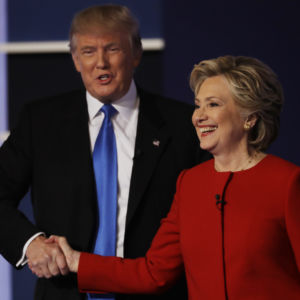Hillary Clinton and Donald Trump spoke on the campaign trail Monday about their opposing visions for the American worker.
The economy has remained an important issue throughout the election with many workers struggling. Trump, the Republican nominee, focused on trade, taxes and immigration as ways to improve the labor market. Clinton, the Democratic standard-bearer, said she’d help workers by reining in corrupt corporations while empowering small businesses and moral companies.
“I know how overtaxed and over regulated the working people and companies here are,” Donald Trump told an enthusiastic crowd in Pueblo, Colorado. “It’s an issue to all Americans. Redoing the trade deals, bringing back jobs, they are one and the same.”
Clinton focused on helping small businesses and making sure the rich are paying “their fair share of taxes.” She promised the crowd that she will rebuild the middle class while making sure everyone is playing by the same rules.
“We’re going to crack down on the worst corporate abuses and empower companies willing to take the high road and invest in good jobs, in higher wages and in stronger communities,” Clinton said to a cheering crowd in Toledo, Ohio. “It is wrong that corporations and the super wealthy play by a different set of rules.”
Trump has made immigration a cornerstone of his campaign. He argues illegal immigrants take jobs while also flooding the border with drugs and crime. He adds stopping illegal immigration will benefit all Americans, including the immigrants who have come here through legal means.
“We have an open border and an economy that cannot create full-time, high-paying jobs,” Trump said. “As Americans, you are entitled to the same protections as every other American. Everyone living lawfully inside our borders are entitled to the same things, safe communities, a great education, and access to high-paying jobs.”
While Trump advocated for lowering taxes in general, Clinton made the case that wealthy investors should not be able to pay fewer taxes than middle-class workers. She also countered the claims that lowering taxes for large businesses would be beneficial.
“We’re going to make Wall Street corporations and the super rich start paying their fair share of taxes,” Clinton said. “We’re going to put in place a new exit tax. If companies try to leave our country to avoid paying their fair share, if they try to outsource jobs, they’re going to have to give back every tax break they ever received.”
Trump has also previously advocated for penalizing companies that outsource through taxes. During the speech, however, he steered away from the topic and instead focused on how lowering taxes overall as a means to help all workers across the economy.
“We are going to lower your taxes substantially,” Trump said. “She is going to raise your taxes. We are going to eliminate every unnecessary regulation. We are going to repeal and replace job-killing Obamacare. We will make childcare affordable.”
Trump went on to question whether Clinton was actually sincere in her pledge to help workers. He repeated criticism from the last debate Sept. 26 that she has failed repeatedly to create jobs despite her many years in public service. He accused her of putting her own self-interest above the people she represents.
“She became a senator for New York,” Trump said. “Remember the jobs she was going to produce. She never produced them. Then she became secretary of state. And now she and her husband have made over $200 million, without building a company or creating a single thing of value.”
Nevertheless, Clinton touted her record as a public servant by arguing that she has advocated for workers on a multitude of issues. She promised the crowd that as president she will continue her fight for working people and a fair economy.
“As a senator, I raised the alarm about subprime mortgages,” Clinton said. “I fought to hold reckless manufacturers accountable for toxic toys and household products that threaten our kids. I introduced legislation to protect Americans’ personal data and combat identity theft.”
Trump blamed the establishment for negotiating trade deals that put other countries before American workers. He also blamed Clinton for supporting the trade deals including the Trans-Pacific Partnership which is pending in Congress. Trump ignored that Clinton denounced the trade deal early in the primaries.
“In addition because of the incompetence of our leaders we run massive trade deficits on an annual basis,” Trump said. “We now have almost $800 billion per year in trade deficits.”
Clinton also detailed her economic plan later in the day during a rally in Akron, Ohio. She touched on many of the same points but also took more time to further criticize Trump while also encouraging the crowd to get registered to vote in November.
The economy has been struggling since it was hit by a recession that ended in 2009. It was sparked by the subprime mortgage crisis and the financial crisis of 2007. The economy has improved greatly in the nearly decade since but at a sluggish and troubling rate.
Job growth has been solid and the labor market even managed to reach full employment. Market indicators elsewhere, however, are showing very troubling signs. The labor force participation rate, for instance, has been in a sharp decline since 2008.
The labor participation rate tracks the number of employed and those actively seeking work as a percentage of the total population. The participation rate factors in those who have suffered long-term joblessness, unlike the unemployment rate.
The Gross Domestic Product (GDP) has also been a point of contention for the labor market. GDP growth has sat at roughly one percent over the past several months. Some economists believe that GDP growth should be at three percent at the very least.

